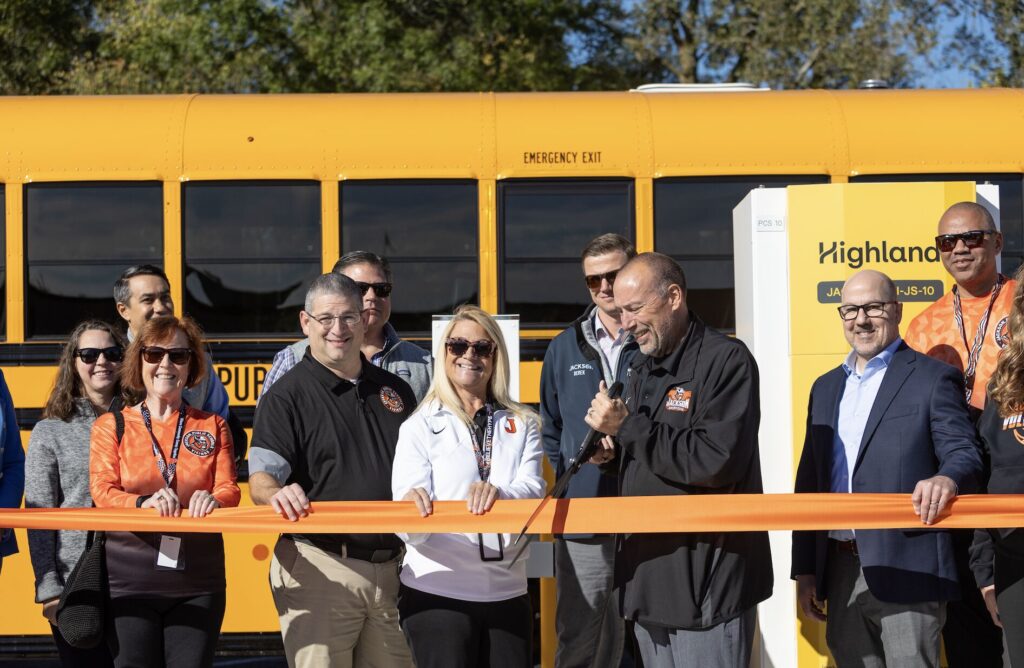DOE Awards $10.9M to Highland Electric Fleets’ Electric School Bus V2G Project
The U.S. Department of Energy (DOE)’s Grid Deployment Office has selected the Scaling Vehicle-to-Grid (V2G) Integration Nationally (SVIN) project to receive approximately $10.9 million in cost-share funding. This initiative is designed to accelerate the adoption of V2G technology across the United States. The project brings together Highland Electric Fleets, a leading provider of school bus fleet electrification-as-a-service, 12 utility providers, educational institutions and supporting partners.
As part of the SVIN project, 14 V2G pilot programs will be deployed across the nation, utilizing electric school buses. These pilots will explore how electric school buses can serve as mobile energy storage units, enabling the buses to supply power back to the grid when needed. This effort not only supports the transition to cleaner energy but also enhances grid resilience by integrating renewable energy sources through V2G technology.

Vehicle-to-Grid (V2G) technology enables electric vehicles (EVs) to discharge stored energy back to the grid, offering critical support during peak demand periods or emergencies. This capability allows V2G-enabled vehicles to act as mobile distributed batteries, enhancing grid flexibility, reducing the need for expensive infrastructure upgrades, and helping lower emissions from peaker plants. By integrating renewable energy sources more effectively, V2G can also support cleaner and more resilient energy systems.
However, V2G deployment has been limited at a national scale primarily due to the absence of utility programs that recognize the full value of V2G services. Utilities have been slow to adopt widespread V2G programs, lacking the necessary data and regulatory frameworks to support commercial-scale integration.
The Scaling Vehicle-to-Grid (V2G) Integration Nationally (SVIN) project aims to address this gap. By partnering with Highland Electric Fleets, utility providers, and educational institutions, the project will deploy 14 V2G pilot programs using electric school buses across the country. The goal is to generate data and hands-on experience to demonstrate the value of V2G services for utilities, thereby providing the foundation for the development and acceleration of commercial V2G programs. These pilots will inform regulators and utility stakeholders, potentially catalyzing a national shift toward broader V2G adoption.
“Highland Electric Fleets has pioneered V2G projects that help stabilize the grid and provide emergency power using electric school buses—an ideal vehicle for V2G services due to their prevalence, consistent short trips, and long dwell times,” said Matt Stanberry, VP of Market Development at Highland Electric Fleets. “Now, with this generous grant provided by the U.S. Department of Energy and in collaboration with our utility partners, we can further demonstrate how V2G can help ensure communities have access to affordable and reliable electricity when and where they need it.”
The funds awarded to the Scaling Vehicle-to-Grid (V2G) Integration Nationally (SVIN) project come from the Grid Resilience and Innovation Partnerships (GRIP) Program, which represents the federal government’s largest direct investment in critical grid infrastructure. This program, established under the Bipartisan Infrastructure Law and administered by the U.S. Department of Energy’s (DOE) Grid Deployment Office, aims to enhance the reliability and resilience of the nation’s electric grid.
The GRIP Program leverages both federal funding and private investments to build a grid capable of withstanding extreme weather events while supporting the transition to affordable and clean energy. By fostering innovation and promoting grid upgrades, the GRIP initiative also aims to create local economic opportunities, particularly through the expansion of green energy jobs. Through projects like SVIN, the GRIP Program plays a pivotal role in shaping a more sustainable and resilient energy future for the U.S.
“As extreme weather events continue to stress electric systems across the country, the Biden-Harris Administration is using every tool in the toolbox to make sure America’s power grid can provide reliable, affordable power,” said Maria Robinson, Director, Grid Deployment Office, U.S. Department of Energy. “Highland Electric Fleet’s innovative collaboration with utilities to deploy V2G technologies will enhance grid flexibility and resilience, reduce expensive distribution system upgrades, and increase clean energy integration while ensuring customers have access to affordable and reliable electricity.”
The Scaling Vehicle-to-Grid (V2G) Integration Nationally (SVIN) program will implement a series of V2G electric school bus pilots in collaboration with Highland Electric Fleets, its project team, and utility partners across the U.S. These pilots will provide utilities with valuable hands-on experience to help design future V2G programs. Based on the results, SVIN will develop a comprehensive V2G Policy and Program Toolkit, offering scalable utility program models and best practices for successfully integrating V2G technology.
In addition, SVIN will establish data-driven, standardized metrics to evaluate the value of V2G assets, leveraging real-time data from utilities and vehicle operators. This approach aims to enable grid operators to optimize their V2G program designs, making them more efficient and better suited to customer needs. Highland will utilize its expertise, along with the technical support of Dynamic Organics and policy and program specialists such as Tierra Resource Consulting, The Climate Center, Colorado State University, and Zero Net Energy Alliance.
The project will also support the creation of an estimated 778 construction, installation, and utility jobs, drawing on resources from local unions, utility teams, and fleet operators. Notably, seven of the project sites are located in Disadvantaged Communities—underserved areas that will benefit from the infrastructure development. Four of these sites will feature vehicle-to-building capacity, integrating V2G technology with energy storage and solar power to support community centers, enhancing their resilience and ability to function during emergencies.
Highland and Partners Roll out 21 New Electric School Buses in Michigan
In October, Highland Electric Fleets partnered with Jackson Public Schools (JPS) in Michigan to roll out 21 new electric school buses. These buses represent a cleaner and quieter mode of transportation, creating a healthier and more enjoyable experience for students, parents, and the broader community. The project is part of a collaboration between Highland, Consumers Energy, and the U.S. Environmental Protection Agency (EPA), all working together to transform student transportation to a cleaner and greener energy source.

“We all think about how buses were when we were kids, and not much has changed. These new buses are quiet, they’re streamlined, they’re brand new for our students. I think, for our district, it’s another way we are showing our kids that they deserve the very best,” says JPS Assistant Superintendent of Communications and Community Outreach, Kriss Giannetti.
In a fleet of approximately 50 buses, Jackson Public Schools will transition 21 of them from diesel to electric, thanks to an $8.3 million grant from the U.S. Environmental Protection Agency (EPA). According to JPS Superintendent Jeff Beal, these electric buses are a great fit for the Jackson community, marking a significant step toward more sustainable transportation for the school district.

According to Joshua Williams, Senior Midwest Regional Manager at Highland Electric Fleets, the electric school buses for Jackson Public Schools can travel 70-100 miles before requiring a charge, with about 70 miles of range even in Michigan winters. Highland Electric Fleets is also responsible for performing any necessary repairs on the buses.
JPS Superintendent Jeff Beal said replacing several of the district’s older diesel buses with cleaner vehicles could be the “first step for what might be an electric Jackson.”

Electric Vehicle Marketing Consultant, Writer and Editor. Publisher EVinfo.net.
Services